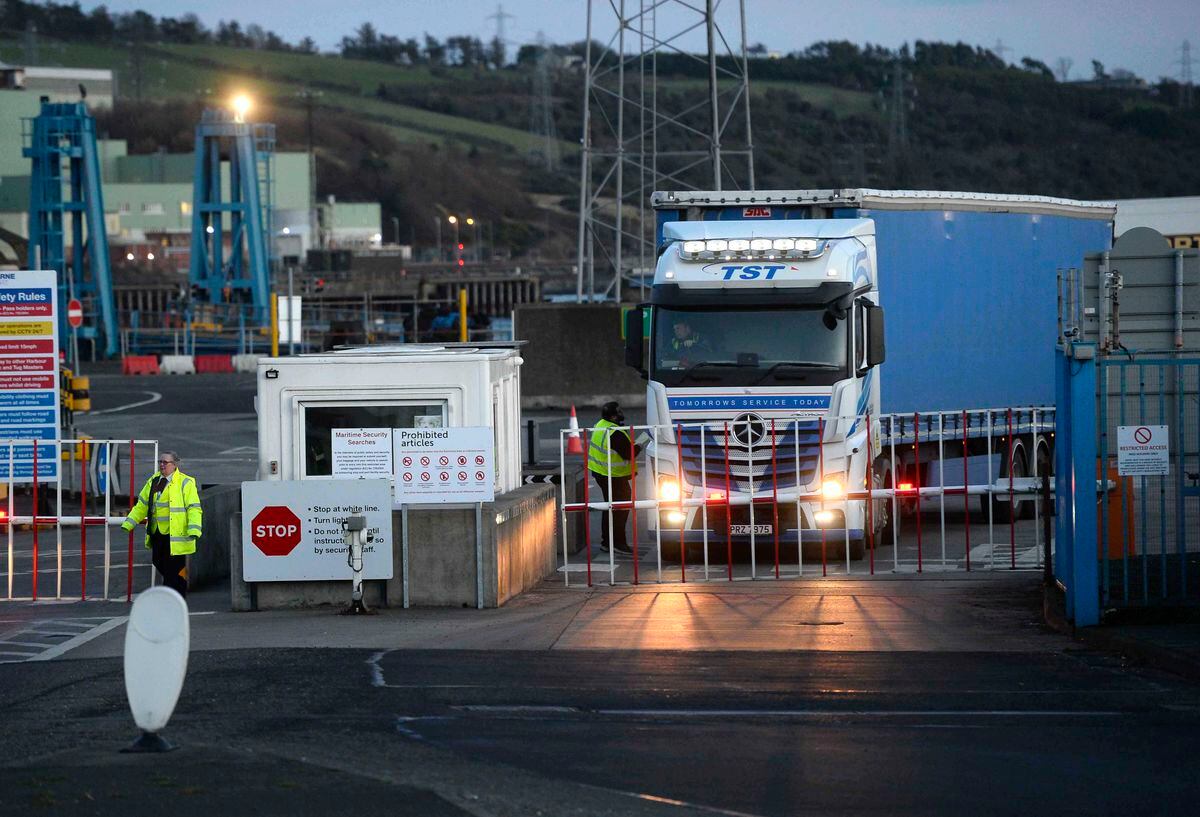Northern Ireland, and especially its fit into the United Kingdom, forces British politicians to that constant Florentine exercise of pacts, compromises and gestures that they so detest when the European Union does it.
The Democratic Unionist Party (DUP) has this week finally lifted a blockade of more than two years on the normal functioning of the self-government institutions - Assembly and Executive -, after arduous negotiations with the Government of Rishi Sunak.
In front of the gallery - especially in the face of the Northern Irish unionist population, willing to see in each change a new betrayal of Great Britain - the DUP has managed to reopen the content of the Windsor Framework Agreement, which Sunak and the president of the European Commission, Ursula von der Leyen, in that British town almost a year ago, to obtain new concessions.
The new pact reached between the main unionist party and Downing Street eliminates the “green lines” designed by London and Brussels, which eliminated control obstacles for merchandise traffic between Great Britain and Northern Ireland and vice versa.
It was a relevant concession from the EU to alleviate the tension around this issue, but it was of little consequence to the DUP.
Symbolically, he still considered Northern Ireland to be treated differently from the rest of the United Kingdom.
“The green line will be replaced by a UK internal market system that will govern all movement of goods and merchandise that remain within the country, backed by new protections for historic trade flows and the reduction of burdens and formalities,” he says. the pact reached between the DUP and Westminster, baptized with the significant name of
Safeguarding The Union
.
Both London and Dublin, co-responsible for preserving the peace and institutional normality achieved in Northern Ireland with the Good Friday Agreements of 1998, have celebrated that the DUP finally lifted its blockade.
Both governments are convinced that the EU will not put obstacles in the way of a pact more aimed at appeasing unionists and saving face for the party leadership, and whose provisions do not really represent many changes to what was agreed a year ago between Sunak and Von der Leyen.
The union of Ireland, closer
The recovery of the normal functioning of the Northern Irish autonomous institutions gives the green light to a historic event.
In May 2022, Sinn Féin achieved a historic victory in the Northern Ireland regional elections for the first time, facing a divided unionism.
As established by the Good Friday Agreement, the result implied that Michelle O'Neill, the republican candidate, had to occupy the chair of chief minister of the Northern Irish Government, something difficult to swallow for the most radical unionism, which has never stopped seeing to Sinn Féin as the heirs of IRA terrorism.
It is very possible that as soon as this Saturday, O'Neill will be proclaimed chief minister, and the party has resurrected, in the midst of the euphoria, the ghost of a reunification of the island.
In recent years, the number of Catholics has surpassed that of Protestants in Northern Ireland, and the divisions of Brexit - which was largely rejected there - have once again put on the table the constitutional debate about a united Ireland, which the Agreements themselves of Good Friday they contemplated as a future possibility.
“Keep in mind that partition [as the division of the island of Ireland in 1921 is called] was designed so that there would be a permanent unionist majority.
That is no longer the case,” announced Mary Lou McDonald, president of Sinn Féin on both sides of the invisible border between the two Irelands.
O'Neill's appointment as Home Rule chief minister, and the not unrealistic possibility of a future Sinn Féin Executive in Dublin, "may lead to a new constitutional settlement that ends partition", McDonald warned, to the irritation of many unionists.
“I welcome the significant step that the DUP has taken to be able to recover the Autonomous Executive of Northern Ireland, in the same way that I also thank the rest of the parties in Northern Ireland for the patience they have shown.
After two years without a Government, hope has arisen again to restart power sharing [between unionists and republicans], which will strengthen our union, give citizens back their institutions of self-government and achieve a better future for Northern Ireland. North,” Sunak announced in the House of Commons.
New legislation
Another of the measures agreed with the British Government, which the DUP is able to present to its people as a relevant victory, is Downing Street's promise to process new legislation so that the rules that the EU may approve in the future are not of automatic and immediate application in Northern Ireland.
They must first be submitted to the scrutiny of the Stormont Assembly (as the Northern Irish Regional Parliament is known).
The Windsor Framework Agreement already established a so-called “emergency brake” by which, with the vote of 30 deputies, the application of new community regulations in Northern Ireland could be stopped.
The prior guarantee now obtained by the unionists puts them, in their eyes, at a similar level to the rest of the territories of the United Kingdom.
The pact also promises additional legislation to “reaffirm the constitutional status of Northern Ireland” within the country, which will “reaffirm the sovereignty of the British Parliament over everything that concerns” that part of the territory.
That is, a lot of symbolism to convey tranquility to a unionism that feels its political position increasingly weaker in the face of the advance of republicanism.
Follow all the international information on
and
X
, or in
our weekly newsletter
.
Subscribe to continue reading
Read without limits
Keep reading
I am already a subscriber
_

